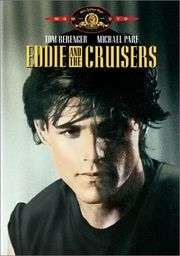Eddie and the Cruisers
Eddie and the Cruisers is a 1983 American film directed by Martin Davidson with the screenplay written by Martin and Arlene Davidson, based on the novel by P. F. Kluge.
The movie follows a fictional '60s rock band called Eddie and the Cruisers. The band makes a name for itself while playing regularly at a Somers Point, New Jersey club called Tony Mart's. It is there that they meet Frank Ridgeway, whom Eddie Wilson hires to be the band's keyboard player and lyricist. Doc Robbins and Sal Amato are skeptical of hiring Frank, who is not a trained musician or experienced song writer, but Eddie believes that Frank is crucial to the band's development. The movie then continues to detail the rise of band to the top of the charts as well as the lives of the band members involved. When the movie begins in the 1980s, The band's music is experiencing a revival, Eddie has been missing (and presumed dead) for 18 years, and a documentary filmmaker is looking up the old members.
The film was followed by a sequel, Eddie and the Cruisers II: Eddie Lives! in 1989.
- A Good Name for a Rock Band
- Almighty Janitor: Eddie and the Cruisers met Frank when he was working as a janitor at the bar they used to play. Joann finds out that he's conveniently also an amazing poet and Eddie decides to hire him after reading his poetry.
- The Band Minus the Face: Sal was the only original member in a new version of The Cruisers.
- Cool Car: Eddie's '57 Chevy.
- Creator Backlash: The cast and crew who worked on Eddie and the Cruisers II: Eddie Lives! admit to not liking the movie.
- The Eighties: The movie begins in 1982 and tells The Cruisers' story through flashbacks.
- The Fifties: Even though the movie's flashbacks take place during the early 1960s, the attitudes, clothes, and Eddie's car show that the culture hasn't shifted yet.
- Flanderization: Between the two movies this happens to Eddie.
- Flash Back
- He's Just Hiding: Eddie
- Is That What He Told You?: Frank believed the story that Wendell's death was a result of a heart attack and not a heroin overdose until Sal set him straight.
- Joisey
- Last-Note Nightmare : "A Season In Hell". First it's disturbing, then pretty, then the final note hits and it gets really disturbing. Many radio stations edit this part out.
- Memento MacGuffin: The master tapes for A Season In Hell are sentimental to both Joann and Eddie.
- Notable Original Music: On The Dark Side became a real world pop hit and still gets airplay even today. A Season In Hell also makes it onto radio stations as well, typically with the ending cut out.
- New Sound Album: The never released A Season In Hell album.
- Popular History: Averted. The flashbacks take place in the early 1960s and avoid portraying the era as a free love fest.
- Posthumous Character: Averted!
- Putting the Band Back Together: Doc Robbins suggested this to Frank after hearing that Sal was playing with a new version of The Cruisers.
- Short-Lived, Big Impact - Eddie and the Cruisers as a band is a fictional example.
- The Sixties: The early version that came before Vietnam, the Hippies, and Woodstock.
- Snub By Omission: Eddie does this to Frank when the band performs at Frank's alma mater. When called out on it by a friend of Frank's in the audience, Eddie snidely calls him "Toby Tyler" (in reference to the story about a boy who ran away to the circus).
- Softer and Slower Cover: Inverted. "On The Dark Side" was originally written by Frank as a ballad, but Eddie sped it up into a rocker.
